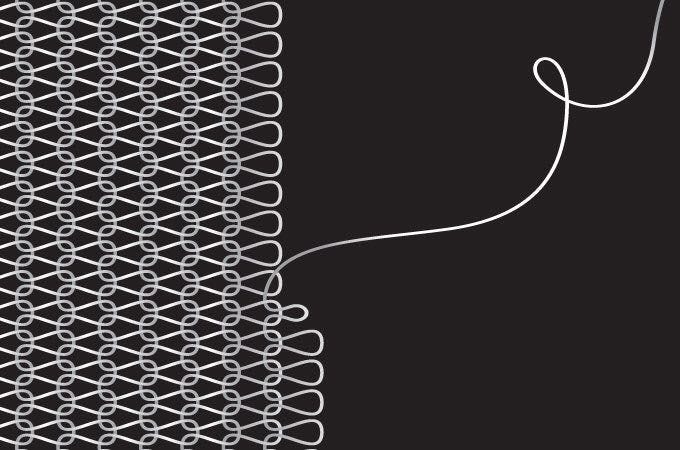Note: You can start reading here or anywhere, then go back. See Table of Contents. Come in the middle? Robert is the narrator who discovers after his wife Lena has died that she had a lover, Isaac. Evan is Isaac’s wife. Robert is on a search for how he lost Lena: He’s creating the story through memory, invention and a search for the truth and his role in what happened—and by stalking Isaac.
Evan, Lena and Isaac
Lena didn’t go to work either in the morning. That night when I got home from work she told me she’d had lunch with Evan at the farm. Here’s what I think happened that first day of June, June the beginning of the end. She’d be dead by the end of August. And so I work my way back from her death, back from the fire in Iowa when I’d gone there to mourn. I ravel the story like a sweater that had a flaw in it, the way I’d seen Lena’s mother take apart her work to get back to the row where she’d dropped a stitch. I ravel and I discover.
***
While I sat in the Phillips Museum, Evan called Lena at home.
Evan had been concerned—that’s what she’d told herself—since Lena’s call yesterday morning, and then admitted that she was oddly obsessed. She said, “Lena, I’m not going into work today. I was thinking maybe you’d come for lunch. I need someone to talk to. Why don’t you come over?”
Lena was surprised by the call but she had called Evan early before work—and then she remembered how early: “My alarm doesn’t go off till seven.” She knew her call had been strange, disturbed Evan. Are you all right?
Perhaps she too should take the day off. She said, “Maybe this would be good for me. But there’s work. I need to think a bit. Could I call you back? I’ll call soon.”
“Sure.”
Once again, Lena was moved by Evan’s kindness—and alarmed by it. Undeserved, she thought as she laid the phone in its cradle. And with that move, her look at that place where the phone lay, the word “cradle” in her head: Cradle to grave. It’s time. I’m old, worn out.
She brewed coffee after she heard the door shut, knew I was gone. “Alone,” she said and thought, What I need is a jester.
She quoted out loud, “Nothing that is so is so.” She sat at the granite island where she and I had fought last night and tried to decide what to do about Evan’s invitation.
***
Last night, while Lena drifted and I took aim, What did Evan and Isaac do? I now know that Evan suspected Isaac, she, betrayed like me. We two are bound to one another.
***
Evan and Isaac had talked amiably, plates filled with his garden tomatoes, her flash sautéed peppered halibut, sprinkled with his cilantro, plates between them like the grown-up order that was their lives. Evan and Isaac were always civil, always dinner well-prepared, always the result of their joint efforts.
Evan mentioned Lena’s call to Isaac, briefly, without explaining really, saying only that she’d called and then how Lena had seemed to forget exactly why she’d called.
“Is she all right?” she asked. She thought it best not to mention the story about the baby because it might trouble Isaac, his work, whatever was bothering him.
“How should I know?” What is she doing? Is she all right? He must see her, talk about his visit to her bed. That’s what he should have done when she’d appeared in his office. Instead he’d bantered with her, seduced and she’d responded—that’s how he would have seen their encounter. What you gonna do about that, cowboy? And then that way she had of looking at him, that last turn of her head. He would have been comforted, felt safe, certain in her love.
He told Evan, “I did see her briefly today. I was working on the bones, finally.”
This news, the progress in Isaac’s work, the fact that Lena had suggested he was troubled by the case seemed to bring her concern for them both together, one, then the other. “Do you know why you delayed?” She hoped he’d explain.
“Evan, that’s a shrink question. You ought to know better. Anyway, does it matter now that I’ve started?”
He was right, that the last thing she should do is try to be his counselor, but she’d been worried for herself as well. They hadn’t made love in so long she couldn’t remember when he’d touched her last. A bit of disorder in their order.
When they made love, they did so seriously: Always on a weekend, in the evening or the morning. Isaac’s touch was tender and exact. Evan responded quickly, thoroughly, coming to orgasm promptly. She’d open her eyes, admire his body, its flush. They would finish in an embrace that often lasted a half hour or more. They used to hold on to one another.
The loss of love-making raised questions. It was a blank space, a hole, an abyss she couldn’t face. She didn’t dare think much about this. Instead, she, more logically, more in tune with her training, thought about how work can interfere, how stress can suppress, and said, not what was on her mind, but, “Yes, you’re right. I’m sorry. How was Lena when you saw her?”
And Isaac saw Lena, standing at his doorway.
She’d entered so quietly he hadn’t heard her—the way she’d stood, as if she were far away and yet present. What was it like? He wasn’t good at metaphors but wanted a way to think about how he saw her.
His garden and where he’d begin the greenhouse, where he’d stand to get the lay of the land, to decide where he’d place the first two-by-fours gave him a chance to think. It was here that he could always get away, the scent of lavender around him, the birds swooping in to feed. The dark-eyed junco, a tiny bird with a surprise of color on its beak, rosy. That color. How he loved to look at her before he kissed the openness between her legs, how the rosy color aroused him, how he couldn’t get enough of her. He thought, Sunflower—prominent in his garden, with its head bowed in the evening, striking, outrageous.
No, she was not classically beautiful, she wasn’t young—she contradicted.
He told the truth. “She seemed slight. I don’t know, not quite there, sort of, and then I was working and then she left. So I’m not sure.”
He had to see her. How could he not have done that later in the day? The bones, yes, his work.
Now, in the morning, Evan waited for Lena to call back.
***
Lena tried to decide what to do. She wanted to go to lunch, receive comfort from Evan, but she feared the made-up story, Evan’s idea. It was too easy and too hard: to be with Evan alone.
She wanted to tell Evan she’d imagined the mess in the basin was the bloody caul, not the lost child. That word “caul.” Translations of the same Hebrew root word in Hosea, sgor, to close: “enclosure,” “caul.” “I … will rend the caul of their heart.” And in Job, zhav sgor, “hidden gold.” The caul, the cover, the veil. How she’d imagined the doctor, the nurses took it off the baby’s face, how the sight of the infant she never saw would rend her heart. Hidden. Forever, forever, this is to be like this. Nothing that is so is so. The Hebrew word olam came to mind, or was it alam?—forever, hidden. Which is it? Oh, where is the place of understanding?
She called. “Evan, yes, I’d be so happy to come to lunch.”
Evan had prepared lunch and the table in the garden, laid down a pale green linen cloth, worn from washing and age, the color of the pale Boston lettuce leaves she’d torn for their salad, tossed with beets that she’d pickled and put up from Isaac’s garden, fine new potatoes sliced warm from the pot, tuna in olive oil, marinated anchovies, her balsamic dressing, a garnish of chives from the herb garden.
She set out wine glasses, placed pale pink napkins on the cloth to pick up the colors in her meal and waited for Lena.
Lena called the office to say she wouldn’t be in. She didn’t call me.
That night she told me she hadn’t gone to work. She told me where she’d been. She told me she’d pulled to the side of the road and nearly turned back, that she’d thought of fire, its colors, chariots on fire. I’d thought, Her work, the Scrolls.
What would Isaac say if he’d known? She’d violated, the violation of another that’s so easy, so quick, so soon forgotten. They must have promised each other never to invade the other’s partnership.
And now I see her in the car, in her black Toyota Camry, the car I sold after she died.
While she drove, she thought of the bloody caul, that part of the amniotic sac around the head of her child, that some called a good omen. How she’d had no need to cut the cord.
She dreamed awake: The baby like a clown in the circus, beryl-blue like sapphire, broke through her transparent skin.
She was on the side of the road. She’d stopped the car but didn’t remember doing so. She was within a half mile of Evan’s house, knew she’d been dreaming, a nightmare. “Fire.” When she arrives, she may shout, “Fire.” Like the clown in the theatre who called out to the laughing crowd while the coulisses burned, while the crowd applauded, disbelieving. She slid the scenery panels of her life through the backstage grooves while they burned and no one saw the fire.
And then she drove to the farm.
Evan took her to the backyard, the set table. She poured wine, took Lena’s hand. “Let’s relax. A glass of wine in the middle of the day—a real day off.” She saw Lena avert her eyes, felt her moist hand, the slight tremor. She’d hoped Lena could help her, that they might talk about Isaac, but Lena was jittery.
Lena didn’t speak. She sat and sipped the wine. She knew her silence was odd, rude even, but Evan didn’t seem offended.
Evan waited, served the salad, said, “It’s probably good to get away from all that stuff you’re doing with the Scrolls. But then you said it was mostly done. Have you decided whether you’re going to Chicago?”
“I guess I’ll have to. It’s actually pretty odd that I’ve been working on this and haven’t seen the exhibit. No one seems to care though. And as I told you it’s been pretty much a done deal. And then I get stuck on stuff.”
“Like what?”
“Chariots and fire. Crazy stuff. Like this: Did you know that Maimonides, the old long dead scholar who explained the Bible—he’s got nothing to do with the exhibit—said Solomon was wise when he said matter, because it’s always changing, is like a married harlot.”
“Like a whore? Gimme a break. Lena, you don’t take this stuff seriously, do you?”
“I get carried away. Everyone seems to be telling me that. I get mixed up. Didn’t we agree yesterday that I’m certifiable?”
“I think we agreed we both might be when we got talking about Isaac’s case, making up the story.”
“The story. Oh that.”
It had been a mistake to come.
Evan said, “So, what do you think? I thought we’d pretty much guessed it, their story. But I’ve learned that’s way too easy. Everybody’s got a story. Believe me, I listen to them all day. And the one thing I know is that whatever seems to be the story is usually off.” She knew that trouble came out this way, through someone else’s story, another story hidden in the telling. But she had no business playing the shrink even if Lena was pretty clearly in some kind of trouble. She was not the one to help because she wanted to talk about Isaac, about what Lena had observed. And she didn’t know how to do that. She and Isaac had the perfect marriage. Everyone thought it, often even said it to them.
Lena walked to the garden, held the soft petals of a peony. Isaac, the garden, the place she didn’t belong, the simple things they could never do: Sit here, eat salad. The potatoes he’d grown. This flower. The lightness of the petals, the touch of his hand across her breast. Did peonies make her think of him? She said, “I love the way they open. It’s a profusion of petals.”
“Oh, the peonies.” Evan put her hand in one, too. “Like my kids when they were babies, skin like flower petals. I’d garden while they took a nap, whenever I could in the good weather. These peonies have been here since before Jason and Rebecca were born.”
“I do envy you your children, Evan.”
“They are terrific, but don’t kid yourself, they’re trouble. Sometimes I think Isaac and I’d be closer if we hadn’t had them. That must be the way it is with you and Robert, with each other all the time, and having time. So many couples are going that way now, not trying to do it all. But it’s hard for women, most of them anyway. I see a lot who’re conflicted, too old to have a baby and wanting one anyway.”
“Women like me.”
“I didn’t mean you. I’m talking about the ones getting on towards forty, still thinking they’ve got a choice and I guess they do. I meant I envy you.”
“But you’ve worked.”
“Well, sure, but with my private practice I could set my hours, make the time. Oh, I didn’t mean that either. Like I’m the one who found a way and you could’ve done that too. Lena, that’s not what I meant. Oh, forget me. Let’s talk about Isaac and that case? You know our little story? The baby in the attic? The old maids?”
Evan seemed again clever with this, to get at it the way Lena imagined psychologists must maneuver with their patients, listening to every word as code for something else.
But Evan was in a muddle. She talked so little while working. She listened. And here she was talking and bungling.
“Let’s not talk about the old maids, Evan. It’s whacky and I’m already whacky. Let’s talk about your herbs.” Lena touched the rosemary growing high, clearly a mature planting. “Evan, they’re like little trees. You’re good at this. May I?” And she put her hand on a branch to break a stem.
“Yes. I love to break it off and smell it.”
Lena handed her the sprig. “‘There’s rosemary. That’s for remembrance.’ Great quote, huh?”
“Yeah. From what?” Okay, this was better. Lena, focused on intellectual stuff, would move them into safer territory.
“Hamlet.” Gertrude—the unfaithful, the betrayer. “Ophelia says, ‘Pray you, love, remember.’ But she’s going mad, or gone. Still, it’s a great line.”
Were they on safer territory? Evan didn’t think so. Better to go back where she’d been. “They’d have had herbs like me.”
“Who?”
“The old maids.”
“Evan, you’re doing it again.”
“I am, aren’t I?” She knew she couldn’t help Lena. She didn’t know why, but she knew. Better to bungle in what she was sure was safer territory. “Listen. They’d pick rosemary from the garden to toss with some roasted potatoes and olive oil. Maybe one of the sisters would be cooking a roast chicken the way I do.”
“Evan,” Lena pleaded. “Forget the old maids, please.”
“Okay, okay. I’m sorry. I kind of thought the story would be a distraction. Not that you need to be distracted. Oh, I’m bungling again.”
“The problem is that I am distracted.”
“Maybe so. But still, it was dumb. Dessert will help. Stay here in the garden. I’ll get it.”
When Evan returned, she had berries. “Crème anglaise,” she said. “It’ll wait.” And Evan decided, she’d wait. She served the dessert and sat quiet. She watched Lena who would have been transfixed by her plate.
The berries lay in a creamy, pale yellow sauce, the color of Lena’s mother’s Limoges china that Lena had served the gazpacho in last night, the cups that she’d washed and dried and put away, the color, yellow like the eggs her mother whipped in an old ceramic bowl, like the mango she’d eaten with Isaac in a room they’d gone to one afternoon.
Now I imagine not a Hyatt but an elegant room in the Willard, a splurge he’d paid for in cash.
She recalled the muted red flowers and green hexagons all over the pale carpet like the color of Evan’s cloth on the table. After drinking orange juice, café au lait, she’d cut into the deep yellow slice of mango, ate slice after thick yellow slice, the color of the eggs her mother had beaten with her whisk until they thickened and lightened to the color of mango. She’d reveled in the coolness of each slice, in the silky texture of the fruit, fibrous and yet smooth on her tongue.
She cut into a blackberry on the plate and saw the deep red-purple juice as if it bled into the creamy yellow sauce. “Evan, she was an old woman and still did that.” Lena was thinking about her mother beating eggs for a sauce or a cake when she was old and had spoken as if Evan were thinking that, too.
“Who?”
“Oh, sorry. My mother. There I go again. Drifting. Anyway, she’d be ashamed of me. She was such a cook, not like you. More plain. I barely do anything.”
“Your mother grew old doing what she knew. Your mother knew you do other work, Lena. I know you know that.” Evan pulled a couple more sprigs of rosemary. “Here, Lena, here’s rosemary. Take it. Smell it.” Evan held the rosemary close to her face. “I can smell earth and ferns and cool air.”
“Like death.”
“Why do you say such a thing?”
“She’s dead and I’m still talking about being ashamed.”
“Shame. Well, we need it, I guess.”
“But what good is it?” Lena said and then thought, If I’m no good at totaling it?
Evan waited.
“How could he say you don’t listen? That’s what you do. Most people can’t do that.”
“I haven’t been so good at it today. I’m sorry.”
“You know you’ve got it though, the habit of silence at the right moment,” said Lena. “You’ve got that. Too often that’s just the right thing and too often no one seems to know that. I think there are two kinds of silences. The listening silence. What you understand. And the silent lie. The wisdom to be silent or the crime to be silent. I don’t know which is which anymore.” She stirred the berries in the sauce, watched the juice color the cream.
And still Evan waited.
“I can’t have children, Evan.”
“Oh, Lena, I’m sorry—and what we talked about before. I am sorry.”
“Don’t be sorry. It’s my own fault. Once I could. I can’t have them because of an abortion. It was a long time ago. I was young.”
“How young?”
“No, no, not like that. I was old enough. I could have had the baby. I thought of having the baby. I waited, I waited too long. It was still okay to do it, but the risks. There are risks.”
“Was it with Robert?”
“Robert doesn’t know. He thinks I’m barren, and indeed,” she laughed, “indeed, I am.”
“Did you tell the man?”
“No, I’ve never told anyone.” She shouldn’t have told Evan and knew it. “Evan, I’ve got to go now.” It was Isaac she needed to tell. Maybe he knew? Maybe her secret was like something barely seen but not missed, maybe it was like the button on her blouse that would slip open at the bosom when she leaned toward him, a silken opening. “Don’t ask me anymore. Evan, please.”
But it was Evan who had had a glimpse of something. And she was good at totaling. She thought, There they were, the two of them, alone, sitting on the loveseat. “The other day, Lena, when you were here with Isaac?”
“What?”
“Is that what you—?”
“No, of course not.” From sorrow to fear is not so far. And now, as if she were behind the stage, she saw that the scenery was burning. She was pushing forward the changing backgrounds, and they burned away as she pushed them. She was undone.
“Like paper dolls,” she said.
“What?”
“The way they unfold.”
Evan took Lena’s hand.
“Like earth and ferns and cool air,” Lena said. Evan’s face, her brown-green eyes, the words from the psalm, I had erred when I looked for her, confirmed what she knew, that she’d gone too far. She said, “I behave oddly. Nothing new for me. I’m sorry.”
Evan’s cool hand was like Lena’s mother’s cool hands that rolled out pastry, fitted filmy dress patterns to her shoulders, that created clarity with these acts.
Evan, with Lena’s tremulous hand in hers, placed her hand atop and closed the round.▵
Isaac and Evan, chapter 19 coming next
Table of Contents
Love,















I am wildly late to this party, but the tension here is exquisite!
Wow. I really love how you’ve developed the relationship between Evan and Lena. What a surprise, what a deepening of the plot. The revelation, ooof. And the hands at the end. Beautiful storytelling as always, my friend.